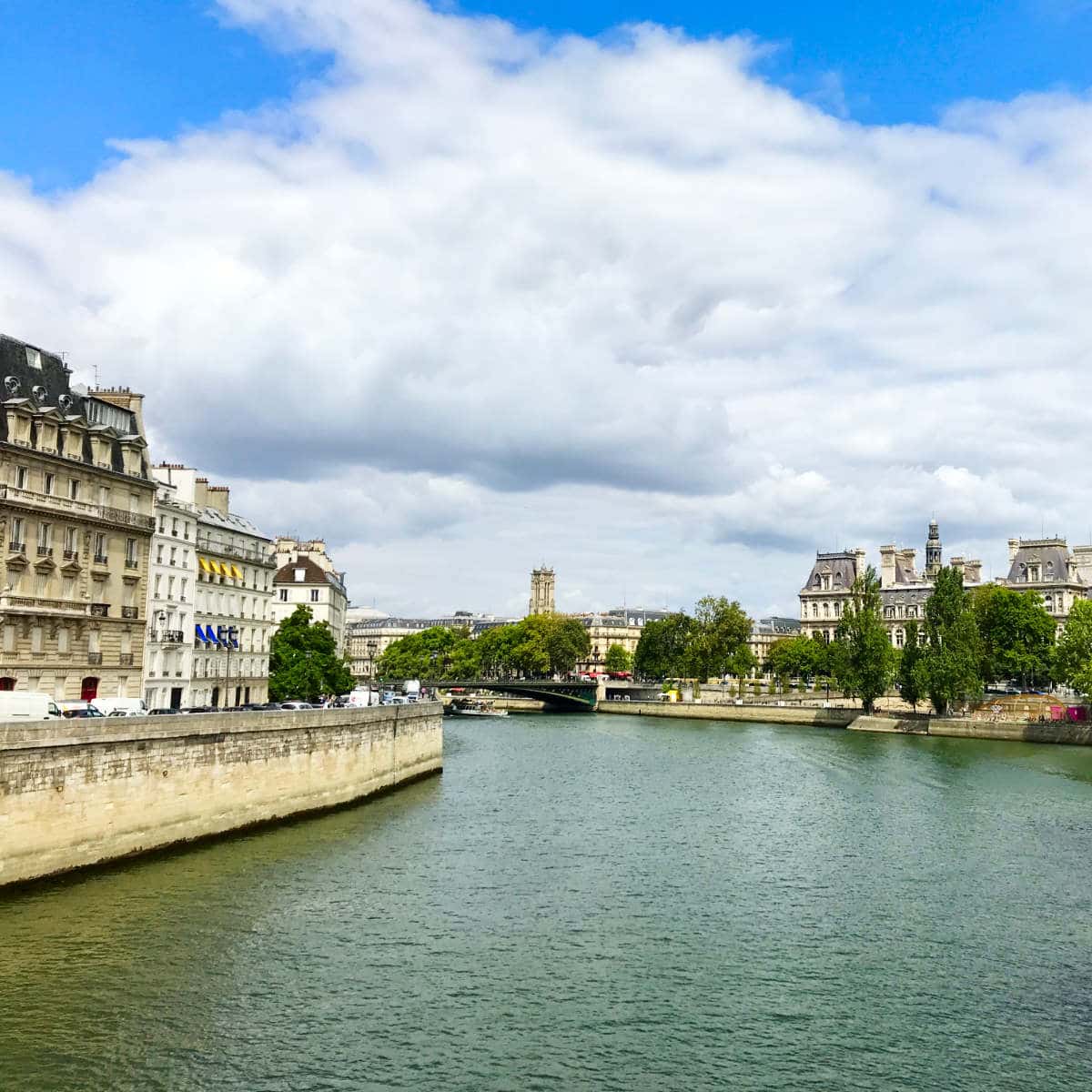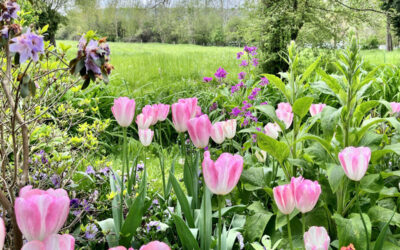When we think of the most romantic cities in the world, Paris immediately comes to mind. With its beautiful architecture and long history of romance, it is no wonder so many poets from France and overseas have been swept off their feet by the City of Lights.
One of the things that readers will note about many of the poems written about Paris, is that the perspective of the poem changes depending on whether the poet is French or a foreigner.
While visitors tend to look at Paris with rose-colored glasses, the locals see the city with rather more jaded view, moving from awestruck wonder to melancholy. So covering the different perspectives, here are the top poems about Paris, with English translation. Allons-y!
1. Pont Mirabeau – Guillaume Apollinaire
One of the most famous poems about France and Paris is the Pont Mirabeau, which was first released in 1912 as a tribute to lost love.
Apollinaire was considered one of the foremost French poets of the early 20th century. Moving to Paris in 1900, he became fast friends with other famous contemporaries of his time including Pablo Picasso, Henri Rousseau, Gertrude Stein, French artist Marc Chagall, and more.
A plaque sits on the Pont de Mirabeau bridge in Paris, repeating the first lines of the poem.
| French Poem about Paris | English Translation |
|---|---|
| Sous le pont Mirabeau coule la Seine Et nos amours Faut-il qu’il m’en souvienne La joie venait toujours après la peine | Under the Mirabeau Bridge flows the Seine And our loves Must he remind me of that Joy that always came after pain |
| Vienne la nuit sonne l’heure Les jours s’en vont je demeure | Let night ring the hour The days go by I remain |
| Les mains dans les mains restons face à face Tandis que sous Le pont de nos bras passe Des éternels regards l’onde si lasse | Hands in hands let’s stay face to face While under The bridge of our arms pass The eternal gaze on the wave so weary |
| Vienne la nuit sonne l’heure Les jours s’en vont je demeure | Let night ring the hour The days go by I remain |
| L’amour s’en va comme cette eau courante L’amour s’en va Comme la vie est lente Et comme l’Espérance est violente | Love goes like this running water Love flies away How slow life is And as Hope is violent |
| Vienne la nuit sonne l’heure Les jours s’en vont je demeure | Let night ring the hour The days go by I remain |
| Passent les jours et passent les semaines Ni temps passé Ni les amours reviennent Sous le pont Mirabeau coule la Seine | Pass the days and pass the weeks No time spent Neither love returns The Seine flows under the Mirabeau bridge |
| Vienne la nuit sonne l’heure Les jours s’en vont je demeure | Let night ring the hour The days go by I remain |
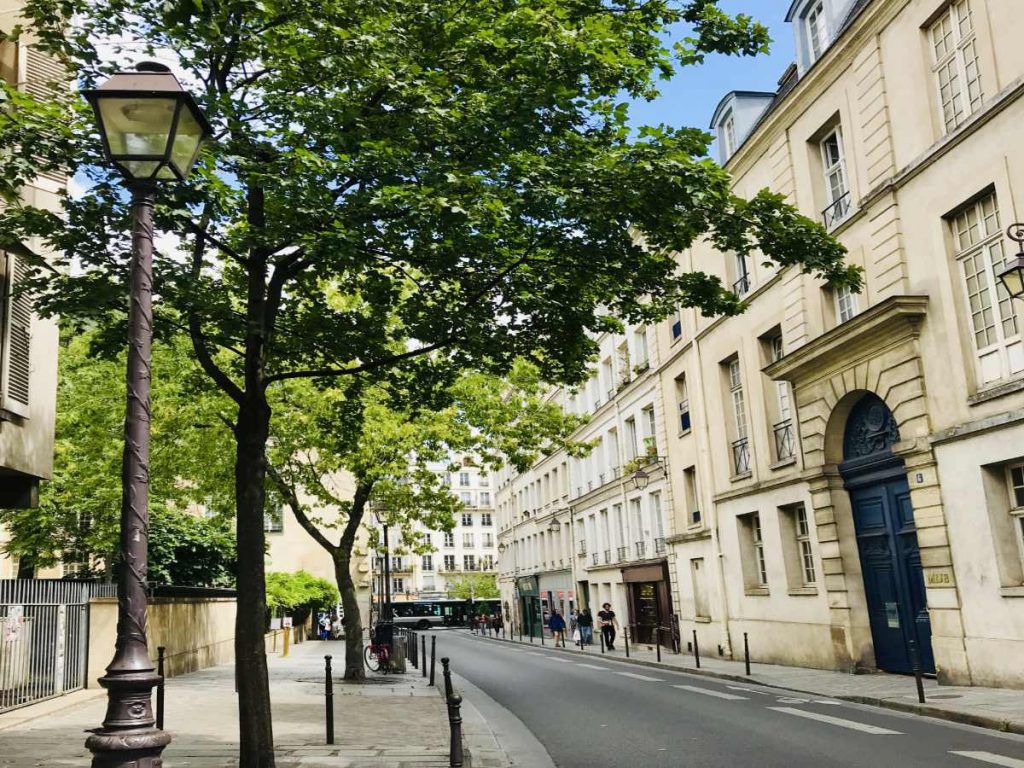
2. Paris in Spring – Sara Teasdale
Sara Teasdale was an American poet who she won a Pulitzer Prize for her 1917 poetry collection Love Songs.
Her poem about Paris and the Bois de Boulogne expresses that magical feeling and romance of being in the City of Lights in the spring.
| Poem about Paris |
|---|
| The city’s all a-shining Beneath a fickle sun, A gay young wind’s a-blowing, The little shower is done. But the rain-drops still are clinging And falling one by one — Oh it’s Paris, it’s Paris, And spring-time has begun. |
| I know the Bois is twinkling In a sort of hazy sheen, And down the Champs the gray old arch Stands cold and still between. But the walk is flecked with sunlight Where the great acacias lean, Oh it’s Paris, it’s Paris, And the leaves are growing green. |
| The sun’s gone in, the sparkle’s dead, There falls a dash of rain, But who would care when such an air Comes blowing up the Seine? And still Ninette sits sewing Beside her window-pane, When it’s Paris, it’s Paris, And spring-time’s come again. |
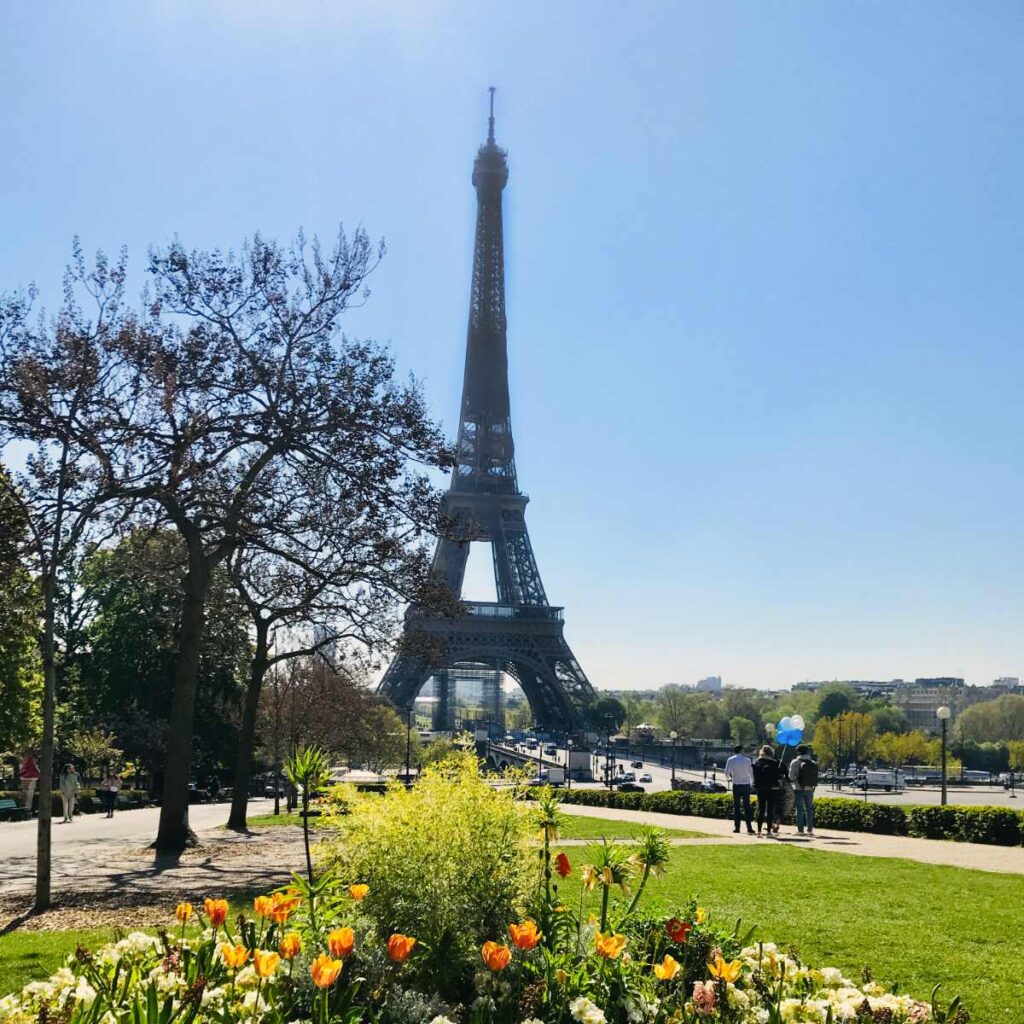
3. La Tour Eiffel – Maurice Carême
A wonderful poem many French children learn in primary school is Maurice Carême’s La Tour Eiffel. Carême is Belgian not a French poet, but it remains a lovely poem about Paris nonetheless.
| French Poem | English Translation |
|---|---|
| Mais oui, je suis une girafe, M’a raconté la tour Eiffel. Et si ma tête est dans le ciel, C’est pour mieux brouter les nuages, Car ils me rendent éternelle. | But yes, I am a giraffe, Told me about the Eiffel Tower. And if my head is in the sky, It is to better graze the clouds, Because they make me eternal. |
| Mais j’ai quatre pieds bien assis Dans une courbe de la Seine. On ne s’ennuie pas à Paris : Les femmes, comme des phalènes, Les hommes, comme des fourmis, | But I have four feet well seated In a curve of the Seine. You never get bored in Paris: The women, like moths, Men, like ants, |
| Glissent sans fin entre mes jambes Et les plus fous, les plus ingambes Montent et descendent le long De mon cou comme des frelons La nuit, je lèche les étoiles. | Slip endlessly between my legs And the wildest, the wildest Up and down along From my neck like hornets At night, I lick the stars. |
| Et si l’on m’aperçoit de loin, C’est que très souvent, j’en avale Une sans avoir l’air de rien. | And if you see me from afar, It’s that very often, I swallow it One without looking like anything. |
☞ READ MORE: Famous French quotes about travel
4. Paris – Jules Supervielle
Born in Uruguay to French parents, Jules Supervielle was orphaned during a family visit to France at 1 year old and raised by his grandmother.
He would go on to be nominated for the Nobel Prize in Literature three times.
| French Poem about Paris | English Translation |
|---|---|
| Ô Paris, ville ouverte Ainsi qu’une blessure, Que n’es-tu devenue De la campagne verte. | O Paris, open city Like a wound, what have you become From the green countryside. |
| Te voilà regardée Par des yeux ennemis, De nouvelles oreilles Écoutent nos vieux bruits. | Here you are looking Through enemy eyes, new ears Listen to our old sounds. |
| La Seine est surveillée Comme du haut d’un puits Et ses eaux jour et nuit Coulent emprisonnées. | The Seine is monitored Like from the top of a well And its waters day and night Flowing imprisoned. |
| Tous les siècles français Si bien pris dans la pierre Vont-ils pas nous quitter Dans leur grande colère ? | All French centuries So well set in stone Won’t they leave us In their great anger? |
| L’ombre est lourde de têtes D’un pays étranger. Voulant rester secrète Au milieu du danger | The shadow is heavy with heads From a foreign country. Wanting to stay secret In the middle of danger |
| S’éteint quelque merveille Qui préfère mourir Pour ne pas nous trahir En demeurant pareille. | Extinguishes some wonder who would rather die To not betray us By remaining the same. |
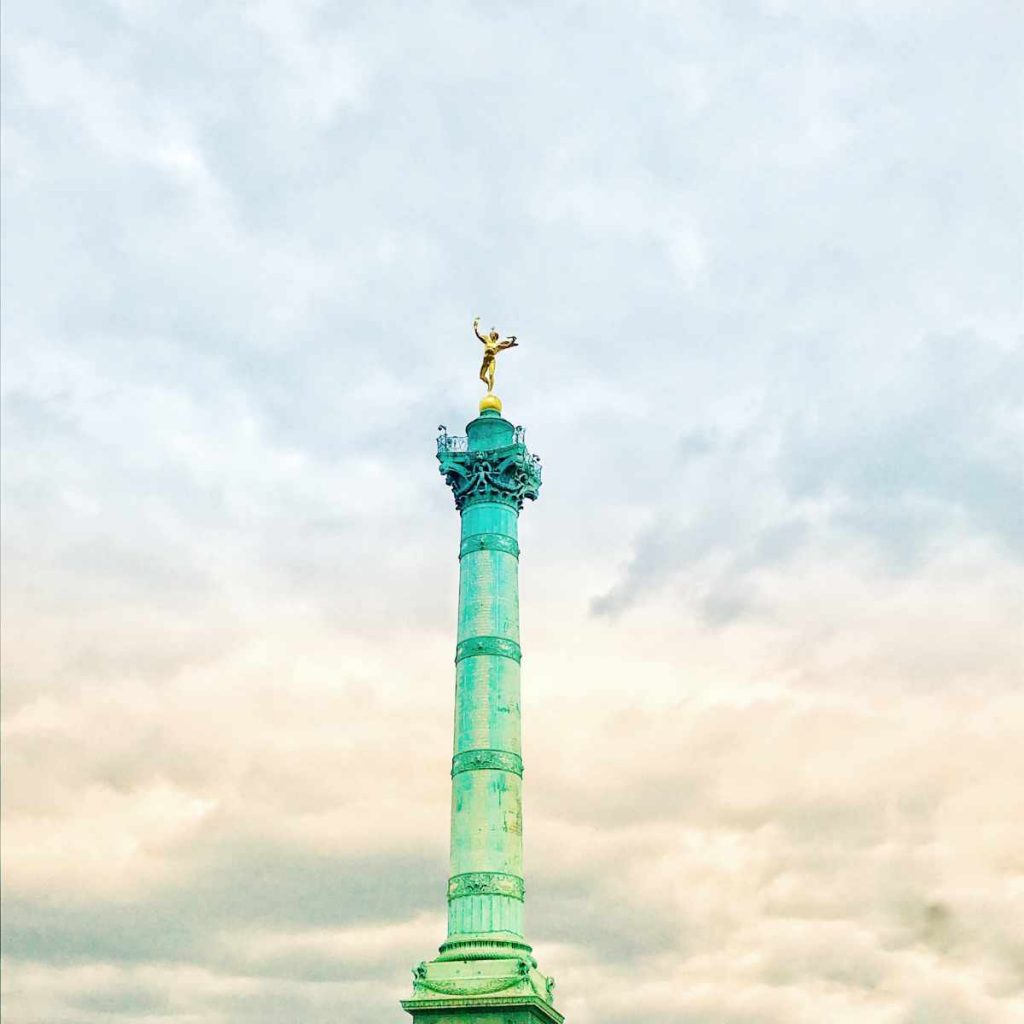
5. Place de la Bastille, Paris – Dante Gabriel Rossetti
English poet Dante Gabriel Rossetti wrote about the Place de la Bastille in Paris during a visit there in 1849.
It is here at the Place de la bastille, where once stood the ancient fortress prison called Bastille Saint-Antoine dating back to the 14th century.
On July 14, 1789 the revolutionaries stormed into the Bastille, freeing all the prisoners and beheading the prison’s governor and stuck his head on a spike. The French revolution had begun.
Today, the site of the Bastille is a large circular roundabout and a tall pillar in where the famous “Génie de la Liberté” (Spirit of Freedom) commemorates the revolution of 1789 and 1830.
| Poem about Paris |
|---|
| How dear the sky has been above this place! Small treasures of this sky that we see here Seen weak through prison-bars from year to year; Eyed with a painful prayer upon God’s grace To save, and tears which stayed along the face Lifted at sunset. Yea, how passing dear Those nights when through the bars a wind left clear The heaven, and moonlight soothed the limpid space! |
| So was it, till one night the secret kept Safe in low vault and stealthy corridor Was blown abroad on gospel-tongues of flame. O ways of God, mysterious evermore! How many on this spot have cursed and wept That all might stand here now and own Thy Name. |
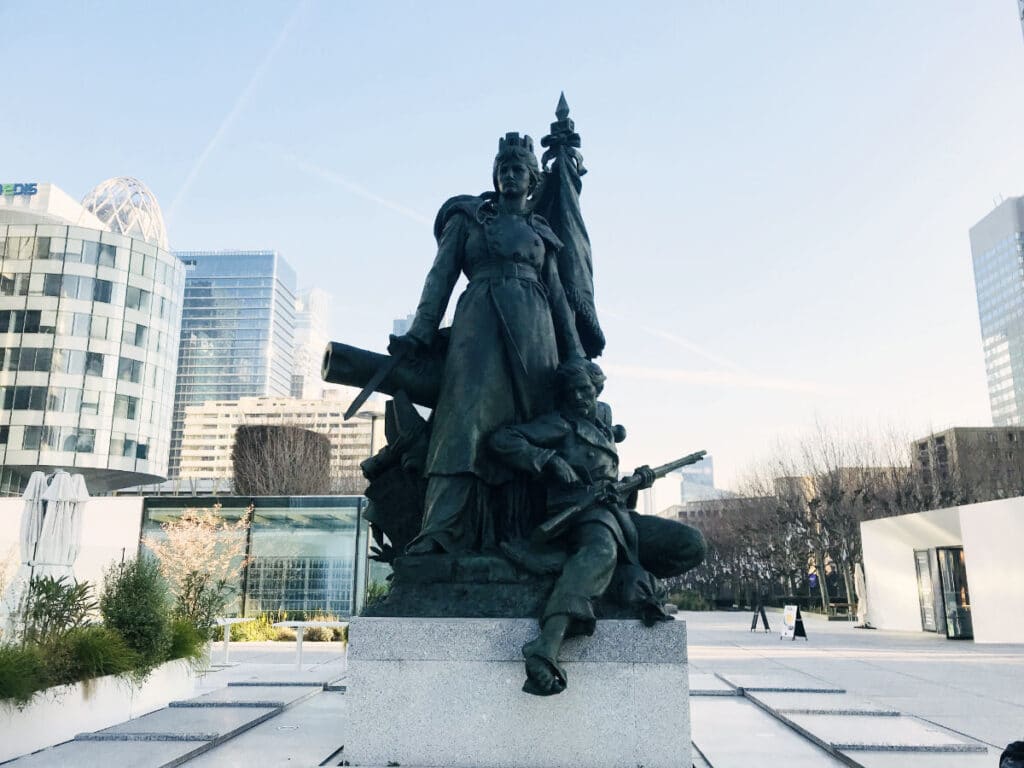
6. Paris bloqué (Paris blocked) – Victor Hugo
One of France’s most famous writers and poets has to be Victor Hugo. With a career spanning over 60 years, he wrote everything from satire to poetry, critical essays and historical odysseys. Many of his time-honored works including love poems, kids’ poems, and quotes live on today.
In his poem “Paris blocked, collection the Terrible Year” which was published in 1872, Hugo writes about the Siege of Paris during the Franco-Prussian war, when German troops surrounded the city.
| French Poem about Paris | English Translation |
|---|---|
| Ô ville, tu feras agenouiller l’histoire. Saigner est ta beauté, mourir est ta victoire. | O city, you will make history kneel. Bleeding is your beauty, dying is your victory. |
| Mais non, tu ne meurs pas. Ton sang coule, mais ceux Qui voyaient César rire en tes bras paresseux, S’étonnent : tu franchis la flamme expiatoire, Dans l’admiration des peuples, dans la gloire, Tu retrouves, Paris, bien plus que tu ne perds. | But no, you’re not dying. Your blood is flowing, but those Who saw Caesar laughing in your lazy arms, Are astonished: you cross the expiatory flame, In the admiration of the peoples, in glory, You find, Paris, much more than you lose. |
| Ceux qui t’assiègent, ville en deuil, tu les conquiers. La prospérité basse et fausse est la mort lente ; Tu tombais folle et gaie, et tu grandis sanglante. | Those who besiege you, mourning city, you conquer them. Low and false prosperity is slow death; You fell mad and gay, and you grew bloody. |
| Tu sors, toi qu’endormit l’empire empoisonneur, Du rapetissement de ce hideux bonheur. Tu t’éveilles déesse et chasses le satyre. | You go out, you whom the poisonous empire slept, Of the reduction of this hideous happiness. You wake up goddess and hunt the satyr. |
| Tu redeviens guerrière en devenant martyre ; Et dans l’honneur, le beau, le vrai, les grandes moeurs, Tu renais d’un côté quand de l’autre tu meurs. | You become a warrior again by becoming a martyr; And in honor, beauty, truth, high morals, You are reborn on one side when on the other you die. |
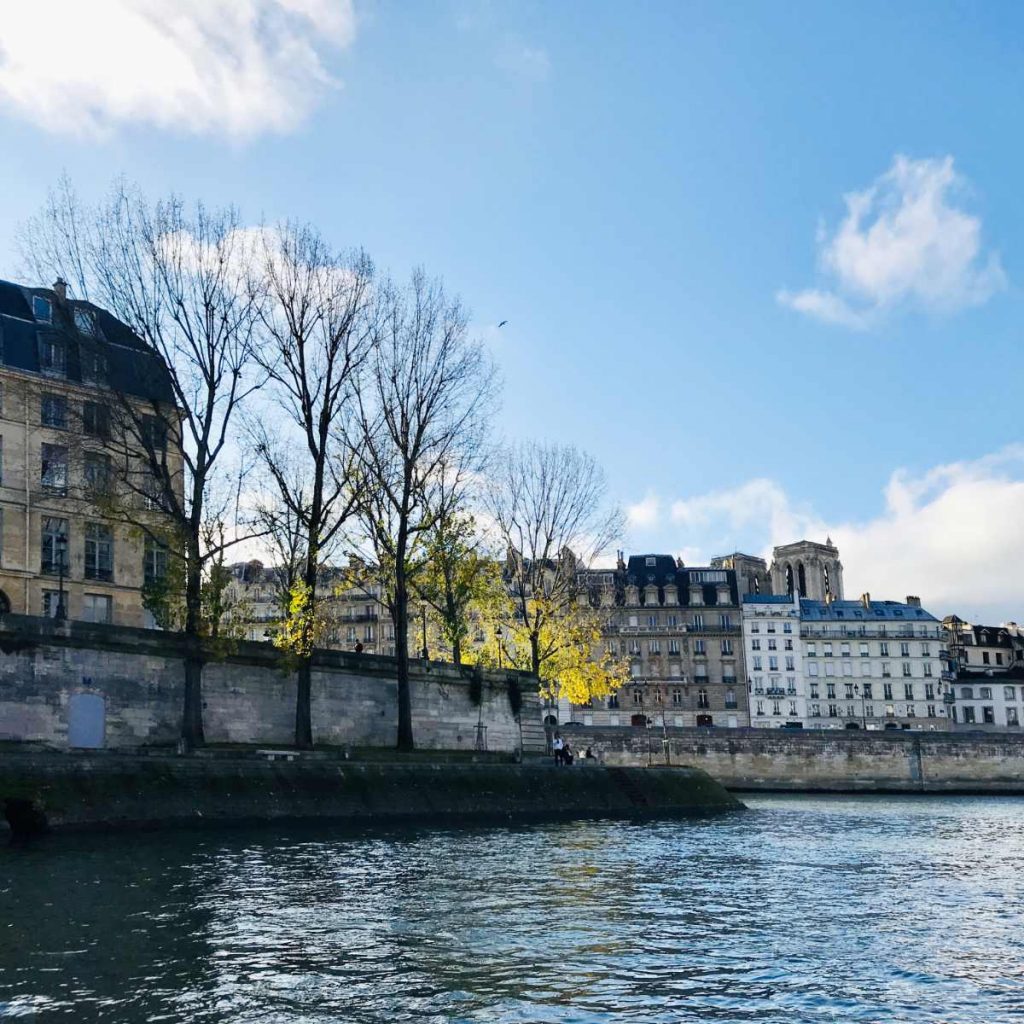
7. Chanson de la Seine – Jacques Prévert
Poet and screenwriter Jacques Prévert wrote a number of screenplays, and his poetry that are still taught in French schools today.
Here he writes a beautiful poem about the Seine river that flows through the center of Paris. You can read and listen to some beautiful songs about Paris here.
| French Poem about Paris | English Translation |
|---|---|
| La Seine a de la chance Elle n’a pas de soucis Elle se la coule douce Le jour comme la nuit Et elle sort de sa source | The Seine is lucky She has no worries She takes it easy Day and night And it comes from its source |
| Tout doucement sans bruit Et sans se faire de mousse Sans sorti de son lit Elle s’en va vers la mer En passant par Paris La Seine a de la chance | Quietly quietly And without getting foamy Without getting out of bed She goes to the sea Passing through Paris The Seine is lucky |
| Elle n’a pas de soucis Et quand elle se promène Tout le long de ses quais Avec sa belle robe verte Et ses lumières dorées Notre-Dame jalouse | She has no worries And when she walks All along its quays With her beautiful green dress And its golden lights Notre-Dame is jealous |
| Immobile et sévère Du haut de toutes ses pierres La regarde de travers Mais la Seine s’en balance Elle n’a pas de soucis Elle se la coule douce | Motionless and stern From the top of all its stones look at her sideways But the Seine doesn’t care She has no worries She takes it easy |
| Le jour comme la nuit Et s’en va vers le Havre Et s’en va vers la mer En passant comme un rêve Au milieu des mystères Des misères de Paris. | Day like the night And goes to Le Havre And goes to the sea Passing like a dream In the midst of mysteries the miseries of Paris. |
8. Paris – Paul Verlaine
French poet Paul Verlaine was born in Metz in a somewhat well-to-do bourgeoisie family, and would move to Paris at a young age. It is here that he would publish his first poem Monsieur Prudhomme at the age of 19, finding much much success and literary acclaim.
His beautiful poem Paris expresses a local’s love, where reality meets that idyllic vision of the City of Lights.
| French Poem about Paris | English Translation |
|---|---|
| Paris n’a de beauté qu’en son histoire, Mais cette histoire est belle tellement ! La Seine est encaissée absurdement, Mais son vert clair à lui seul vaut la gloire. | Paris has beauty only in its history, But this story is so beautiful! The Seine is banked absurdly, But its bright green alone is worth the glory. |
| Paris n’a de gaîté que son bagout, Mais ce bagout, encor qu’assez immonde, Il fait le tour des langages du monde, Salant un peu ce trop fade ragoût. | Paris has no gaiety except its patter, But this patter, still quite filthy, It goes around the languages of the world, Adding a little salt to this too bland stew. |
| Paris n’a de sagesse que le sombre Flux de son peuple et de ses factions, Alors qu’il fait des révolutions Avec l’Ordre embusqué dans la pénombre. | Paris has wisdom only the dark Flow of his people and his factions, As he makes revolutions With the Order ambushed in the dark. |
| Paris n’a que sa Fille de charmant Laquelle n’est au prix de l’Exotique Que torts gentils et vice peu pratique Et ce quasi désintéressement. | Paris only has her charming daughter Which is not at the price of the Exotic What kind wrongs and impractical vices And this quasi disinterestedness. |
| Paris n’a de bonté que sa légère Ivresse de désir et de plaisir, Sans rien de trop que le vague désir De voir son plaisir égayer son frère. | Paris has no kindness but its lightness Drunkenness of desire and pleasure, With nothing more than the vague desire To see his pleasure cheer up his brother. |
| Paris n’a rien de triste et de cruel Que le poëte annuel ou chronique, Crevant d’ennui sous l’oeil d’une clinique Non loin du vieil ouvrier fraternel. | Paris has nothing sad and cruel Whether the annual or chronic poet, Dying of boredom under the eye of a clinic Not far from the old brotherly worker. |
| Vive Paris quand même et son histoire Et son bagout et sa Fille, naïf Produit d’un art pervers et primitif, Et meure son poëte expiatoire ! | Long live Paris anyway and its history And his patter and his daughter, naive Product of a perverse and primitive art, And die his expiatory poet! |
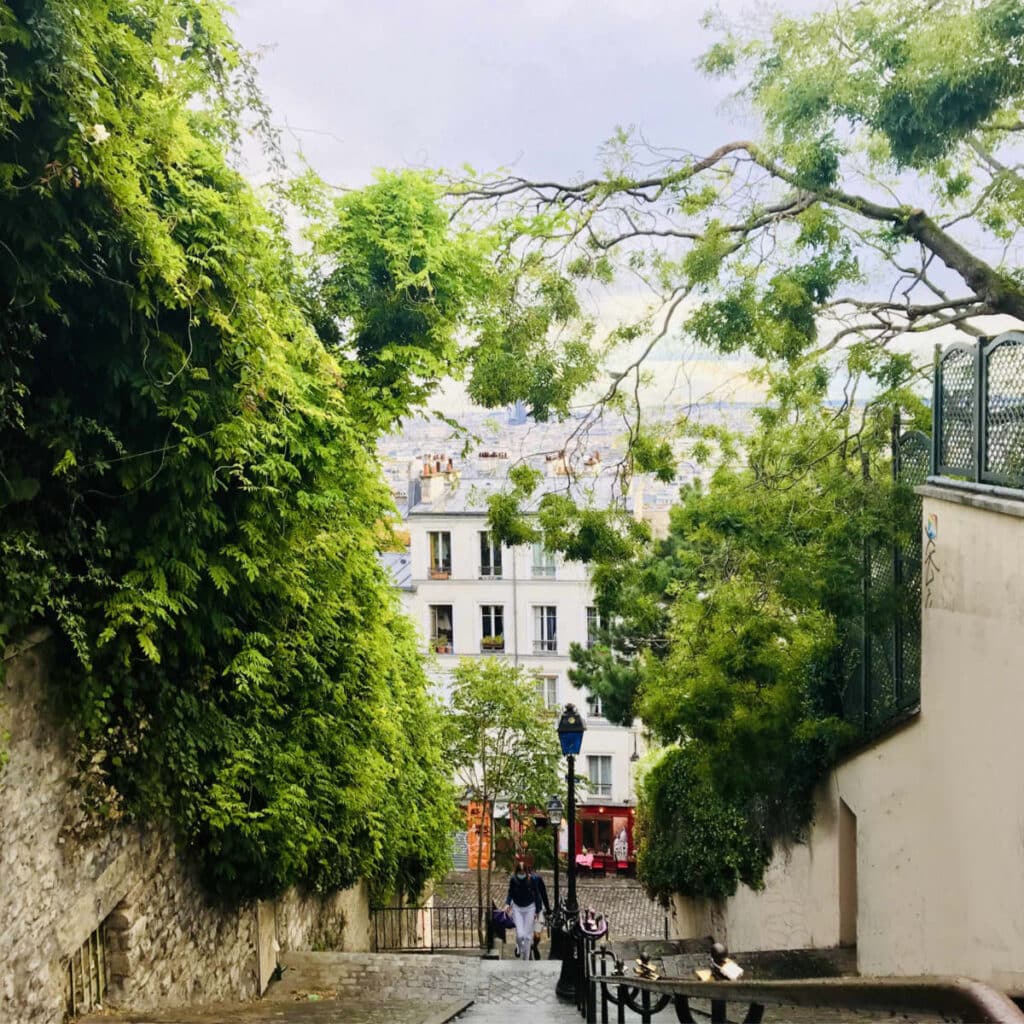
9. Le Spleen de Paris – Charles Baudelaire
Charles Baudelaire was a noted French poet, essayist, and art critic. A contemporary of Victor Hugo, Baudelaire became one of the top French poets of his time.
He too had a mixed view of Paris, and expresses it in this poem titled “the Spleen of Paris”.
| French Poem about Paris | English translation |
|---|---|
| Le cœur content, je suis monté sur la montagne D’où l’on peut contempler la ville en son ampleur, Hôpital, lupanars, purgatoire, enfer, bagne, Où toute énormité fleurit comme une fleur. | With a happy heart, I climbed the mountain From where you can contemplate the city in its fullness, Hospital, lupanars, purgatory, hell, penal colony, Where all enormity blooms like a flower. |
| Tu sais bien, ô Satan, patron de ma détresse, Que je n’allais pas là pour répandre un vain pleur ; Mais comme un vieux paillard d’une vieille maîtresse, Je voulais m’enivrer de l’énorme catin Dont le charme infernal me rajeunit sans cesse. | You know well, O Satan, patron of my distress, That I was not going there to shed empty tears; But like an old bastard of an old mistress, I wanted to get drunk on the huge strumpet Whose infernal charm constantly rejuvenates me. |
| Que tu dormes encor dans les draps du matin, Lourde, obscure, enrhumée, ou que tu te pavanes Dans les voiles du soir passementés d’or fin, | That you still sleep in the morning sheets, Heavy, dark, cold, or you’re strutting around In the evening veils trimmed with fine gold, |
| Je t’aime, ô capitale infâme ! Courtisanes Et bandits, tels souvent vous offrez des plaisirs Que ne comprennent pas les vulgaires profanes. | I love you, O infamous capital! Courtesans And bandits, such often you offer pleasures What the vulgar profane do not understand. |

If you enjoyed that article, you may like to read more quotes about Paris. A bientôt!
